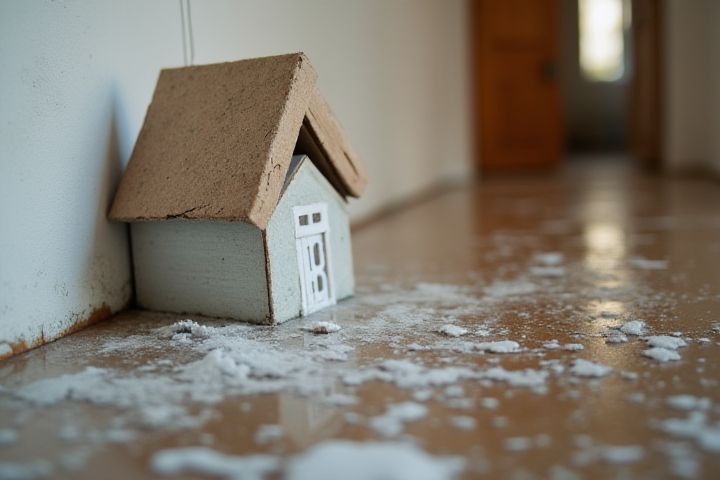
House insurance often covers water damage, but the extent of coverage can vary based on your policy type. Typically, standard homeowners insurance policies may include coverage for sudden and accidental water damage from sources like burst pipes or heavy rain. However, damage caused by flooding, which is usually classified as an excluded peril, often requires separate flood insurance. It's essential to review your policy details to understand specific exclusions and limitations related to water damage coverage. To ensure adequate protection, consider consulting with your insurance provider about the options available for your needs.
Can House Insurance Cover Water Damage
Type of water damage
House insurance typically covers specific types of water damage, including sudden and accidental incidents like burst pipes or malfunctioning appliances. However, it often excludes damages caused by long-term issues such as flooding or sewer backups unless you have additional riders or endorsements. It's essential to review your policy to understand the limits and conditions associated with water damage coverage. Knowing the distinctions between covered and non-covered damages can help you better prepare and protect your property.
Cause of damage
House insurance can cover water damage, but coverage typically depends on the cause of the damage. For instance, if the damage results from a sudden event like a burst pipe or heavy rainfall, your standard homeowners policy may provide coverage. However, if the water damage stems from long-term issues, such as poor maintenance or a slow leak, it might not be included. To ensure your specific risks are covered, review your policy carefully and consider additional endorsements for unique situations like flooding.
Dwelling coverage
Dwelling coverage in house insurance typically protects the structure of your home from various perils, including water damage, but the specifics can vary by policy. Standard homeowner's insurance often covers water damage caused by sudden and accidental incidents, such as burst pipes or a malfunctioning appliance. However, it generally does not cover water damage resulting from flooding or poor maintenance, so it's essential to review your policy for exclusions. For comprehensive protection, consider adding a separate flood insurance policy if you live in a flood-prone area.
Personal property coverage
House insurance typically includes personal property coverage, which can protect your belongings from water damage under specific circumstances. This coverage may apply if the water damage results from a covered peril, such as a burst pipe or an unexpected flooding incident. However, damage caused by floodwaters from natural disasters generally requires a separate flood insurance policy to be adequately covered. It's essential to review your policy carefully to understand the extent of your personal property coverage regarding water damage and any exclusions that may apply.
Named perils
House insurance can cover water damage, but it typically depends on whether it's included under named perils in your policy. For instance, a named peril policy might cover specific incidents like burst pipes or heavy rain leading to flooding, but it usually excludes damages from sewer backups or gradual leaks. It's crucial to review your policy's terms to understand the exact perils covered and any potential exclusions related to water damage. You may also want to consider additional endorsements for comprehensive coverage against water-related issues.
Sudden and accidental events
House insurance typically covers water damage resulting from sudden and accidental events, such as burst pipes or a malfunctioning appliance. For example, if a washing machine leaks and causes damage to your floors or walls, your homeowner's policy may help cover the repair costs. It's important to note that damage from flooding, which is often classified as a separate peril, may require additional flood insurance. Always review your specific policy to understand coverage limits and exclusions associated with water damage scenarios.
Exclusions
House insurance typically provides coverage for various types of water damage, but it often includes specific exclusions that you should be aware of. For instance, most standard policies do not cover damage caused by flooding, which usually requires a separate flood insurance policy. Additionally, if water damage results from neglect or lack of maintenance, such as a leaking roof or broken pipes that you failed to repair, your claim may be denied. Understanding these exclusions helps you assess your risk and consider additional coverage options to protect your home effectively.
Optional endorsements
House insurance typically covers standard water damage from specific sources, such as bursting pipes, but this does not encompass all scenarios. Optional endorsements can enhance your policy to include coverage for additional risks like sewer backup or sump overflow, which are often excluded in basic plans. Depending on your insurer, you might find specific endorsements that address flooding or mold remediation, which could be crucial, especially in high-risk areas. Evaluating your coverage options ensures that you're adequately protected against unforeseen water-related issues in your home.
Flood insurance
House insurance typically does not cover water damage caused by flooding. For this type of risk, you need to invest in separate flood insurance, which specifically protects against damages from rising waters and heavy rainfall. Flood insurance policies often include coverage for both the structure of your home and personal belongings affected by flooding. If you live in a high-risk flood zone, your mortgage lender may even require you to carry flood insurance to protect your investment.
Claim process
House insurance can cover water damage, but the extent depends on the specific policy terms. When filing a claim for water damage, first document the incident with photographs and detailed notes, which can significantly bolster your case. Notify your insurance provider promptly, as many policies require you to report damages within a specified timeframe, typically 24 to 48 hours. Expect an adjuster to assess the damage; having repair estimates on hand will help expedite the resolution process and ensure you receive fair compensation.
